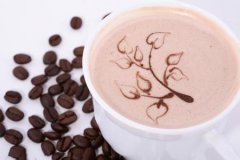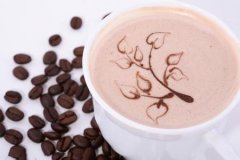Coffee common sense Children who drink energy drinks are easily addicted to caffeine

Schoolchildren who drink too much caffeinated beverages may experience chest pains, headaches and hyperactivity. Energy drinks also encourage some students to behave badly, making it harder for teachers to discipline.
A British expert said that due to the current popularity of teenagers drinking energy drinks, more and more people are addicted to caffeine.
British media reported on the 2nd that studies have shown that if schoolchildren drink too much caffeinated drinks, they may have chest pains, headaches and hyperactivity. In addition, it will encourage some students to behave badly, making it more difficult for teachers to discipline. Drug charities have warned school doctors about caffeine addiction among teenagers.
Let some students behave violently
Students are consuming more and more high-energy drinks and caffeine pills, experts said at a recent conference at the Royal College of Nursing.
Bob Tate, of Drug Education UK, said the cheap and easy availability of these substances had led to an increase in caffeine addiction and related health problems. "Kids will drink on the way to school, between classes, at lunch. If you have a child who likes energy drinks, it's easy for them to get overexcited in class. Tate said school doctors should look for caffeine addiction when students report chest pains, headaches, hyperactivity or sleeplessness.
Shops such as grocery stores are reportedly banned from selling fatty and sugary drinks under new guidelines for healthy eating, but schools are missing the mark. Only a week ago did one school in Britain ban Red Bull from its pupils. School officials say the ban stems from a small number of students behaving violently because of the type of drink.
Some countries ban energy drinks
Sales of energy drinks have been rising in recent years. Red Bull Beverage sales in the UK alone reached £ 271 million. Each can of Red Bull contains 80 milligrams of caffeine-the equivalent of drinking a cup of coffee. Claimed to stay awake for a long time, these high-energy drinks are popular among students, clubbers, workers and drivers. However, a significant number of countries have reportedly banned or restricted the sale of certain brands of energy drinks for fear that they may trigger symptoms such as high blood pressure and palpitations.
Last month, researchers found that drinking just one can of energy drinks increases the risk of heart attack or stroke. The study, conducted by Australia academics, found decaffeinated sugar-free drinks can also make the body's blood thicker, increasing the chance of fatal blood clots.
Important Notice :
前街咖啡 FrontStreet Coffee has moved to new addredd:
FrontStreet Coffee Address: 315,Donghua East Road,GuangZhou
Tel:020 38364473
- Prev

Coffee Health Common Sense Women Drink Coffee Often Less Heart Disease
Drinking coffee regularly does not increase the risk of premature death, but reduces the risk of dying from heart disease, a new study shows. Researchers at the Autonomous University of Madrid in Spain followed 84214 American women between 1980 and 2004 and 41736 American men between 1986 and 2004. and published the results in the recently published Journal of Internal Medicine.
- Next

Coffee drinking in women reduces risk of uterine cancer, study suggests
Coffee drinkers have a much lower risk of uterine cancer than coffee drinkers, according to a large-scale survey by Japan's Ministry of Health, Labor and Welfare. Uterine cancer, like cervical cancer and ovarian cancer, is a common reproductive organ tumor that threatens women. From 1990 to 1994, the Japanese Ministry of Health, Labor and Welfare conducted research on about 54,000 people in 10 regions of the country, Jiji News reported Monday.
Related
- Beginners will see the "Coffee pull flower" guide!
- What is the difference between ice blog purified milk and ordinary milk coffee?
- Why is the Philippines the largest producer of crops in Liberia?
- For coffee extraction, should the fine powder be retained?
- How does extracted espresso fill pressed powder? How much strength does it take to press the powder?
- How to make jasmine cold extract coffee? Is the jasmine + latte good?
- Will this little toy really make the coffee taste better? How does Lily Drip affect coffee extraction?
- Will the action of slapping the filter cup also affect coffee extraction?
- What's the difference between powder-to-water ratio and powder-to-liquid ratio?
- What is the Ethiopian local species? What does it have to do with Heirloom native species?

